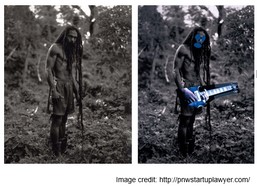Using a Photo for Educational Purposes
Court Case
Cariou v. Prince, 2013 is a copyright case in the United States. Please note that the judgment falls under a legal jurisdiction other than the UK. Cariou v. Prince is a copyright case in the United States on whether Richard Prince’s appropriation of art treatment of Patrick Cariou’s photograph was a copyright infringement or fair use. Prince copied several of Cariou’s original photographs and engaged in various transformations, including printing them, increasing their size, blurring or sharpening, adding content (sometimes in colour), and sometimes compositing multiple photographs together or with other works.
The author takes no responsibility for the content of this page, which is not intended as binding legal advice. The views are about copyright in the UK Higher Education sector context.